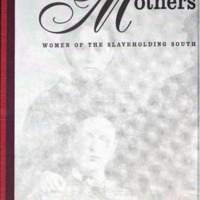-
Title
-
Mothers of invention : women of the slaveholding South in the American Civil War
-
Description
-
When Confederate men marched off to battle, white women across the South confronted unaccustomed and unsought responsibilities: directing farms and plantations, providing for families, and supervising increasingly restive slaves. As southern women struggled "to do a man's business," they found themselves compelled to reconsider their most fundamental assumptions about their identities and about the larger meaning of womanhood. Drew Faust offers a compelling picture of the more than half-million women who belonged to the slaveholding families of the Confederacy during this period of acute crisis.According to Faust, the most privileged of southern women experienced the destruction of war as both a social and a personal upheaval: the prerogatives of whiteness and the protections of ladyhood began to dissolve as the Confederacy weakened and crumbled. Faust draws on the eloquent diaries, letters, essays, memoirs, fiction, and poetry of more than 500 of the Confederacy's elite women to show that with the disintegration of slavery and the disappearance of prewar prosperity, every part of these women's lives became vexed and uncertain. But it was not just females who worried about the changing nature of gender relations in the wartime South; Confederate political discourse and popular culture - plays, novels, songs, and paintings - also negotiated the changed meanings of womanhood.Exploring elite Confederate women's wartime experiences as wives, mothers, nurses, teachers, slave managers, authors, readers, and survivors, this book chronicles the clash of the old and the new within a group that was at once the beneficiary and the victim of the social order of the Old South. Mothers of Invention show how people managed both to change and not to change and how their personal transformations related to a larger world of society and politics. Beautifully written and eminently readable, this study of women and war is a pathbreaking and definitive study of the forgotten half of the Confederacy's master class.
-
Identifier
-
575562
-
807822558
-
Creator
-
Faust, Drew Gilpin
-
Source
-
Brian Lamb Booknotes Collection
-
Gift of Brian Lamb, 2011.
-
Catalog record
-
Language
-
eng
-
Date
-
1996
-
Program air date: September 1, 1996
-
Publisher
-
University of North Carolina Press
-
George Mason University. Libraries. Special Collections & Archives
-
Text
-
Transcription of Annotations
Notes on half-title: Jeff Davis dressed as a woman 228. Endnotes will reward the reader. Mary Chestnut. Why is the Civil War the most written about period in American History. What relationship does Vietnam have to the Confederate side. Photos in the South vs. the North. 4 million black slaves. Museum of the Confederacy. Twenty nigger law," "What happened to churches/religion. Conscription. Mourning. Hospitals. Vietnam-any relationship to South in Civil War. Notes on title page: Lady--term. What are sumptuary laws. Belle Boyd-The Spy 216. 400 women served in Confederate Army. Burial of Latane. What happened to marriage. Homosexuality teacher shares bed with students. Underlinings/Notes: Underlinings: crisis of identity, new Confederate woman, thoughts, emotions, beliefs of women, details of women's lives, relationships with husbands, fear of pregnancy, everyday life, fears during the War. Notes: "Mom dies at 19," "500 women," "whiteness, maleness, womanhood," "numbers in war," "Lady," "Lucy Wood," "positive views on secession," "more manly," "tears," "Jeff Davis," "want to be men," "1000 voluntary groups," "sewing," "most popular in South," "on stage," "1862 18-35 men draft; 1865 17-50," "3 of 4 white men eligible served," "devastating blow," "followed their husbands," "being poor," "home spinning," "homespun dresses," "spinning for the first time," "cotton cards," "sewing," "a second front," "exemption--1 white for every 20 slaves," "women--no votes, no arms," "fear," "poison," "Chestnut no fear but a murder," "sexual vulnerability," "black soldiers in the South," "no fear 88 slaves," "my closest friend a slave," "slapped, hit, whipped," "loss of control," "anticipating freedom," "Lizzie & Meyers," "whipping Sam," "the whip," "violence and physical dominance," "a market glut," "just breakfast," "sex," "tired of managing," "Sarah Hughes," "slaves to freedom," "farms in the South," "teachers--7% women N.C.," "inferior mind," "refugees," "lose dignity," "place of combat," "government job," "Jeff Davis," "Salaries," "Mary Chestnut refused outside work," "Nightingale 1860 note," "public debate," "nursing reservations," "Juliet Opie Hopkins," "black women as nurses," "hospital matrons," "Lizzie no sexual contact without protection," "sex," "1/4 wartime death of southern men of military [age] 25% dead," "women to women," "crushes," "homosexuality," "teacher shares bed with student," "Richmond 1862-286 marriages," "1864 117," "God on our side," "too much riches," "the Bible," "prayer [. . .] churches closed [. . .]damaged," "couldn't pray for Lincoln," "home services," "unconverted and the hereafter," "theodicy, God & evil," "mourning," "William Latane," "altered behavior," "no war coffins," "undermining religious certainty," "Jeff Davis," "rejected God," "Women-act as a pilot and compass," "Confederate flag," "400 women served in the army," "Belle Boyd, spy," "an enigma," "clothing," "Mary Chestnut," "Richmond's free blacks," "South's sumptuary laws," "hoopskirt," "hoops and the economy," "hair," "men & women in each other's clothing," "Jeff Davis dressed as a woman," "desire to be a man," "female bread toters," "the intellect of a man," "changing lives as if they were costumes," "Vietnam and the South," "traumatic stress," "Staunton Insane Asylum," "Catherine Cooper 10 sons, 5 grandsons," "without food," "Hate the Confederacy, sick and tired of this war," "Dixie Speller," "enough is enough [. . .] come home," "parties, balls, dances," "upper-class, lower-class," "1. new realism; 2. bitterness; 3. isolation," "women became teachers," "Vietnam lessons," "white males," "disdain for men," "feminism-restricted appeal in the South-today," "C. Vann Woodward, William Faulkner, Susan B. Anthony."
-
Subject
-
"Women--Confederate States of America--History."
-
Relation
-
Original Booknotes interview
-
Rights
-
This work may be protected by copyright laws and is provided for educational and research purposes only. Any infringing use may be subject to disciplinary action and/or civil or criminal liability as provided by law. If you believe that you are the rights-holder and object to Mason’s use of this image, please contact speccoll@gmu.edu.
 575562.pdf
575562.pdf